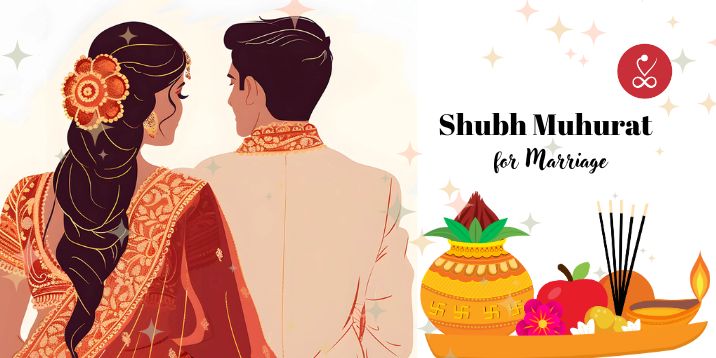Best Shubh Muhurat for Your Wedding
Finding the best Shubh Muhurat (auspicious time) for your wedding is an important aspect in many Hindu traditions. It’s believed that getting married during a Shubh Muhurat can bring prosperity, happiness, and harmony to the couple's married life. Here’s a guide to help you identify the ideal time for your wedding:
Consult a Professional Astrologer:
- The most accurate way to find a Shubh Muhurat is to consult a trusted astrologer who can analyse the birth charts (Kundli) of both the bride and groom.
- They will consider various factors like planetary positions, Nakshatra (lunar constellation), Rashi (moon sign), and the Tithi (lunar day).
Understanding Key Elements in a Shubh Muhurat:
- Tithi (Lunar Day): Certain Tithis are considered highly auspicious for weddings, such as Dwitiya, Tritiya, Panchami, Saptami, Dashami, and Trayodashi.
- Nakshatra (Constellation): Stars like Rohini, Mrigashira, Uttara Phalguni, Hasta, Swati, and Anuradha are usually seen as favourable for weddings.
- Weekday (Vaar): Each day of the week has its own significance, but Mondays, Wednesdays, Thursdays, and Fridays are generally seen as favourable for weddings.
Check the Hindu Panchang/Calendar:
- The Hindu Panchang (calendar) provides detailed information about Tithi, Nakshatra, and other planetary positions for each day.
- Several websites and mobile apps can provide daily Panchang updates, making it easier to find a Shubh Muhurat on your own if you don’t have access to an astrologer.
Avoiding Inauspicious Periods:
- Certain periods like Chaturmas, Shraadh Paksha (Pitru Paksha), and Holashtak are considered inauspicious for weddings and should be avoided.
- Mercury (Budh) and Venus (Shukra) Retrograde: These periods are generally avoided as they are considered unstable for relationships.
- Avoid days when there is an eclipse (Surya Grahan or Chandra Grahan).
Personal Preferences and Flexibility:
- While it’s ideal to stick to Shubh Muhurats, you should also consider practical factors like the availability of venues, guests' convenience, and any personal preferences.
- Some families may be more flexible with the concept of Muhurats and may decide based on other priorities. It’s important to have a balanced approach to traditions and practicalities.
Online Tools and Calculators:
- There are many online platforms that offer Shubh Muhurat calculators, where you can input your details to find a suitable time.
- While not as personalised as consulting an astrologer, these tools can give you a general idea of auspicious dates for your wedding.
Get a Wedding Muhurat Report:
- Some astrologers and websites offer detailed wedding Muhurat reports. These reports typically include a list of auspicious dates and times for the entire year, making it easier to plan in advance.
By following these steps, you can find a Shubh Muhurat that aligns with your spiritual beliefs and practical considerations for a happy and prosperous start to your married life.
Conclusion:
Finding the best Shubh Muhurat for your wedding involves a blend of tradition, astrology, and practicality. Consulting a professional astrologer, understanding the key elements like Tithi, Nakshatra, and using resources like the Panchang or online tools can help identify auspicious dates. While respecting the traditional aspects, it’s also important to balance them with practical considerations like venue availability and guest convenience. This thoughtful approach ensures that your wedding day is not only auspicious but also convenient and memorable for everyone involved.
FAQs:
Qus 1. Why is it important to get married during a Shubh Muhurat?
Ans. In many Hindu traditions, it is believed that getting married during a Shubh Muhurat brings prosperity, happiness, and positive energy to the couple’s life. It is thought that aligning the wedding with positive planetary positions can ensure a successful marriage.
Qus 2. How can I find a Shubh Muhurat for my wedding?
Ans. You can find a Shubh Muhurat by consulting an astrologer who analyses the birth charts of the bride and groom. Alternatively, you can refer to a Hindu Panchang (calendar) or use online Muhurat calculators for guidance on auspicious dates and times.
Qus 3. What factors are considered in choosing a Shubh Muhurat?
Ans. The key elements include Tithi (lunar day), Nakshatra (lunar constellation), planetary positions, and the day of the week. An astrologer will consider these factors along with the individual birth charts of the couple to find the most auspicious time.
Qus 4. Are there certain periods to avoid for weddings?
Ans. Yes, periods like Chaturmas, Shraadh Paksha (Pitru Paksha), Holashtak, and eclipses (Surya Grahan and Chandra Grahan) are considered inauspicious for weddings. Additionally, some avoid weddings during Mercury (Budh) and Venus (Shukra) retrograde periods.
Qus 5. Can I still get married if I don't find a Shubh Muhurat that suits my schedule?
Ans. Yes, while a Shubh Muhurat is considered auspicious, many families balance it with practical factors like venue availability and guest convenience. You can consult your astrologer to find a time that is at least neutral or not inauspicious.




.png)

Comments